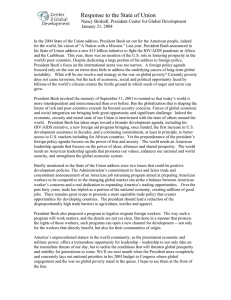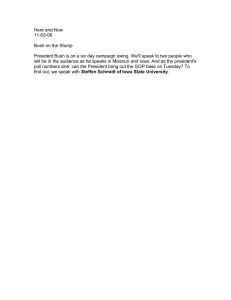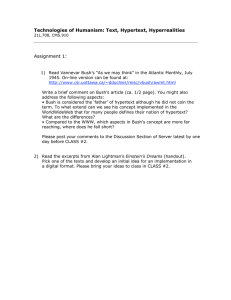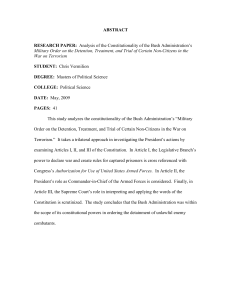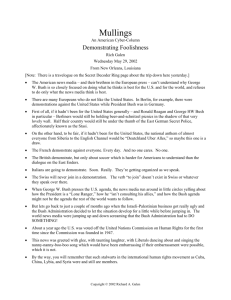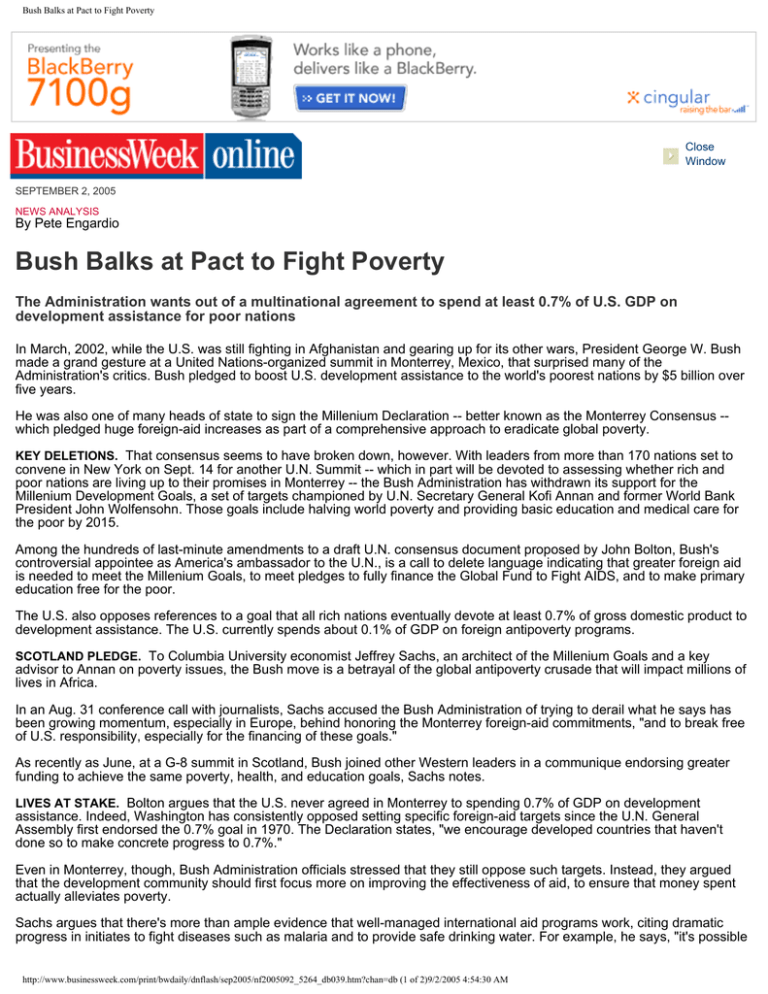
Bush Balks at Pact to Fight Poverty
Close
Window
SEPTEMBER 2, 2005
NEWS ANALYSIS
By Pete Engardio
Bush Balks at Pact to Fight Poverty
The Administration wants out of a multinational agreement to spend at least 0.7% of U.S. GDP on
development assistance for poor nations
In March, 2002, while the U.S. was still fighting in Afghanistan and gearing up for its other wars, President George W. Bush
made a grand gesture at a United Nations-organized summit in Monterrey, Mexico, that surprised many of the
Administration's critics. Bush pledged to boost U.S. development assistance to the world's poorest nations by $5 billion over
five years.
He was also one of many heads of state to sign the Millenium Declaration -- better known as the Monterrey Consensus -which pledged huge foreign-aid increases as part of a comprehensive approach to eradicate global poverty.
KEY DELETIONS. That consensus seems to have broken down, however. With leaders from more than 170 nations set to
convene in New York on Sept. 14 for another U.N. Summit -- which in part will be devoted to assessing whether rich and
poor nations are living up to their promises in Monterrey -- the Bush Administration has withdrawn its support for the
Millenium Development Goals, a set of targets championed by U.N. Secretary General Kofi Annan and former World Bank
President John Wolfensohn. Those goals include halving world poverty and providing basic education and medical care for
the poor by 2015.
Among the hundreds of last-minute amendments to a draft U.N. consensus document proposed by John Bolton, Bush's
controversial appointee as America's ambassador to the U.N., is a call to delete language indicating that greater foreign aid
is needed to meet the Millenium Goals, to meet pledges to fully finance the Global Fund to Fight AIDS, and to make primary
education free for the poor.
The U.S. also opposes references to a goal that all rich nations eventually devote at least 0.7% of gross domestic product to
development assistance. The U.S. currently spends about 0.1% of GDP on foreign antipoverty programs.
SCOTLAND PLEDGE. To Columbia University economist Jeffrey Sachs, an architect of the Millenium Goals and a key
advisor to Annan on poverty issues, the Bush move is a betrayal of the global antipoverty crusade that will impact millions of
lives in Africa.
In an Aug. 31 conference call with journalists, Sachs accused the Bush Administration of trying to derail what he says has
been growing momentum, especially in Europe, behind honoring the Monterrey foreign-aid commitments, "and to break free
of U.S. responsibility, especially for the financing of these goals."
As recently as June, at a G-8 summit in Scotland, Bush joined other Western leaders in a communique endorsing greater
funding to achieve the same poverty, health, and education goals, Sachs notes.
LIVES AT STAKE. Bolton argues that the U.S. never agreed in Monterrey to spending 0.7% of GDP on development
assistance. Indeed, Washington has consistently opposed setting specific foreign-aid targets since the U.N. General
Assembly first endorsed the 0.7% goal in 1970. The Declaration states, "we encourage developed countries that haven't
done so to make concrete progress to 0.7%."
Even in Monterrey, though, Bush Administration officials stressed that they still oppose such targets. Instead, they argued
that the development community should first focus more on improving the effectiveness of aid, to ensure that money spent
actually alleviates poverty.
Sachs argues that there's more than ample evidence that well-managed international aid programs work, citing dramatic
progress in initiates to fight diseases such as malaria and to provide safe drinking water. For example, he says, "it's possible
http://www.businessweek.com/print/bwdaily/dnflash/sep2005/nf2005092_5264_db039.htm?chan=db (1 of 2)9/2/2005 4:54:30 AM
Bush Balks at Pact to Fight Poverty
to save the lives of millions of children who will die this year from malaria, which is entirely preventable because treatments
are there."
BUDGET BOOST. Todd Moss, a research fellow at the Center for Global Development, a Washington think tank, thinks the
U.S. still has an argument. "The issue is, how do we build an international system that allows poor countries to prosper, not
just transfer as much money as possible. I'm very skeptical that we have cracked the nut of aid effectiveness."
Moss notes that if rich countries really spend 0.7% of GDP on development assistance, that would come to about $200
billion. "Nobody thinks we can spend $200 billion sensibly because the current aid system is dysfunctional."
Still, the U.S. could claim that their promise to double development assistance shows they're making progress in moving to
that goal. Besides boosting U.S. contributions to international antipoverty programs, such as the Global AIDS Fund, Bush
pledged to devote another $5 billion to education, health, and development projects under the new Millenium Challenge
Account.
NEOCONSERVATIVE DISLIKE. Under that program, the U.S. would fund programs in poor nations that have developed
comprehensive development blueprints and set up systems to monitor the use of funds and their results. So far, only 16
nations are receiving these funds, and Congress has allocated just $1.5 billion for 2005. But the Bush Administration still
has boosted development assistance by 50% in the past three years, something the Clinton Administration couldn't
accomplish.
So why are Bolton and other U.S. officials now pushing to ditch the high-minded diplomacy altogether? After all, the
Millenium Goals are also championed by Britain's Tony Blair, a staunch U.S. ally, not to mention the rest of Europe. One
obvious explanation is that Bolton is no fan of the U.N. By attacking the Millenium Goals, he's going after the initiative upon
which Kofi Annan's hopes to build his legacy.
The ambitious antipoverty agenda also binds America to funding the kind of multilateral programs that U.S.
neoconservatives detest. The U.S. "is saying to the world that we don't accept global partnership," Sachs charges.
PR NIGHTMARE. In the past few months, most European nations have reaffirmed their commitments to meeting the 0.7%
foreign-aid target. The Bush Administration thinks such promises are grandstanding because nations such as Germany
have too many budget constraints to honor such pledges. Conservatives also note that nations that are very generous with
aid, such as the Netherlands, have very small militaries and don't shoulder much of the expense of maintaining global
military operations that the U.S. does.
But the embarrassment for the U.S. could continue to rise as the year 2015 draws near and it becomes increasingly clear
that the Millenium Goals will not be achieved. As the world's richest nation, blame for not doing more to halt the crises of
AIDS, tuberculosis, lack of education, and extreme poverty inevitably will fall most heavily on America.
Whatever the Bush Administration's motives, it's hard to see how waging a public fight against international antipoverty
goals will shape up as anything but a public-relations headache for the Bush Administration come Sept. 14 in New York.
READER COMMENTS
Engardio is an international senior writer for BusinessWeek
Copyright 2000-2004, by The McGraw-Hill Companies Inc. All rights reserved.
Terms of Use Privacy Notice
http://www.businessweek.com/print/bwdaily/dnflash/sep2005/nf2005092_5264_db039.htm?chan=db (2 of 2)9/2/2005 4:54:30 AM

